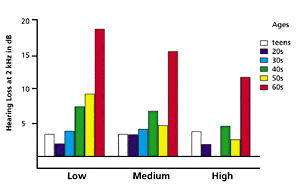The general benefits of attaining cardiovascular health through aerobic exercise are fairly well recognized. What isn’t well recognized is that cardiovascular health and physical fitness are also positively correlated to better hearing. Research demonstrates that with increasing levels of cardiovascular health comes increasing levels of hearing sensitivity. Bottom line: If an older person who is not genetically predisposed to hearing loss can stay fit and avoid major hearing risk factors—such as noise and ototoxic medications—they are far more likely to retain the hearing capabilities of people in their 30s than people who have low cardiovascular health.
Is there a relationship between exercise and better hearing? In plain English, Yes! Recent advances in medicine and positive changes toward healthy lifestyles have challenged some long held assumptions about “inevitable aging changes”—including hearing loss. Impaired hearing in older years has always been considered something to be expected. Although significant hearing loss is present in approximately 1-in-3 Americans ages 65 years and older, we’ve learned that hearing sensitivity can be maintained very well into those “older” years if:
- You were not exposed to loud noises at work or home for long periods of time;
- You wore ear protection when exposed to loud noises;
- You did not take certain ototoxic medications; and
- You maintained a healthy cardiovascular fitness level.
The exception to these findings would be a hearing loss with a genetic component or family history of hearing impairment. Research from our laboratory2-5 and several others6,7 in the United States have consistently reported a positive relation between the cardiovascular system and functional ability of the organs and tissues in the inner ear. Much of the explanation behind the protective effects of cardiovascular fitness lies in enhanced circulation of blood that is needed to supply the bones and muscles of the inner ear. When blood flow is impeded, the nutrients (like antioxidants and protective heat shock proteins) will not be available. Blood flow can be impeded by cholesterol build-up in the walls of the artery, and vasoconstriction (narrowing) that has been correlated with high blood pressure, smoking, stress, and some personality types.

Figure 1. The higher the cardiovascular fitness (shown as low, medium, and high), the better the hearing in most age groups. Reprinted with permission from Alessio & Hutchinson.1
The US Surgeon General’s report on Physical Activity and Health8 recommends that everyone engage in aerobic exercise. Figure 1 shows the benefits of aerobic exercise in most age groups when cardiovascular fitness is attained. This means large muscle movements, such as walking, bicycling, and swimming, for at least 20-30 minutes at a time, five days a week. When examining exercise that is performed on a one-time only basis, aerobic exercise may divert blood flow from metabolically less active parts of the body (like organs and tissues of the inner ear) to metabolically more active parts (like skeletal muscles engaged in exercise). This may at first appear to be harmful. However, exercise on a regular basis has been shown to result in blood that is well-stocked with nutrients (eg, vitamins, antioxidants, and adequate levels of sugar), protective proteins (eg, heat shock proteins), as well as blood that is not littered with cholesterol, triglycerides, or too much sugar.
When performed regularly, aerobic exercise results in blood vessels that tend to be more supple, allowing for transitions in blood flow from rest to exercise, and resilient to withstanding blood pressure changes without suffering major impairments to the walls of arteries. These changes to the vessels that carry blood impact every square inch of the body because cells live or die by blood supply and debris removal.
Our research during the past decade on over 1,000 subjects ages 8 to 88 have resulted in the following conclusions:
- Hearing loss occurs with age, but noticeable hearing loss generally does not appear until after age 50;
- Having low cardiovascular fitness at any age is associated with poorer hearing sensitivity compared to those with a medium or high level of cardiovascular fitness; and
- People older than age 50 who have moderate or high cardiovascular fitness levels maintain their hearing sensitivity comparable to people who are in their 30s.
We speculate that the association of hearing loss and cardiovascular fitness are related by the common mechanism of improved blood circulation.
Acknowledgement
A version of this article originally appeared in Hearing Loss & Hearing Aids: A Bridge to Healing (Second edition),1 edited by Richard Carmen, AuD.


|
References
1. Alessio H, Hutchinson K. Is there a relationship between exercise and better hearing? In: Carmen R, ed. Hearing Loss & Hearing Aids; A Bridge to Healing (2nd edition). Sedona, Ariz: Auricle Ink Publishers; 2003: 132-134.
2. Hutchinson KM, Alessio HM, Hoppes S, et al. Effects of cardiovascular fitness and muscle strength on hearing sensitivity. J Strength Cond Res. 2000; 14:302-309.
3. Alessio HM, Hutchinson KM. Effects of submaximal exercise and noise exposure on hearing loss. Res Q Exerc Sport. 1991; 62:413-419.
4. Cristell M, Alessio HM, Hutchinson KM. Effects of exercise training on hearing ability. Scand Audiol. 1997; 27:219-224.
5. Alessio HM, Hutchinson KM, Price AL, Reinart L, Sautman MJ. Study finds higher cardiovascular fitness associated with greater hearing acuity. Hear Jour. 2002; 55(8):32-40.
6. Johnson LG, Hawkins JE. Vascular changes in the human inner ear associated with aging. Ann Otolaryngol. 1972; 81:364-376.
7. Drettner B, Hedstrand H, Klockhoff I, Svedberg A. Cardiovascular risk factors and hearing loss. Acta Otolaryngol. 1975; 79:366-371.
8. Center for Disease Control and Prevention (CDC). Physical Activity and Health, A Report of the Surgeon General. Available at: www.cdc.gov/nccdphp/sgr/sgr.htm; Accessed: March 10, 2004. Washington, DC: CDC; 1999.





